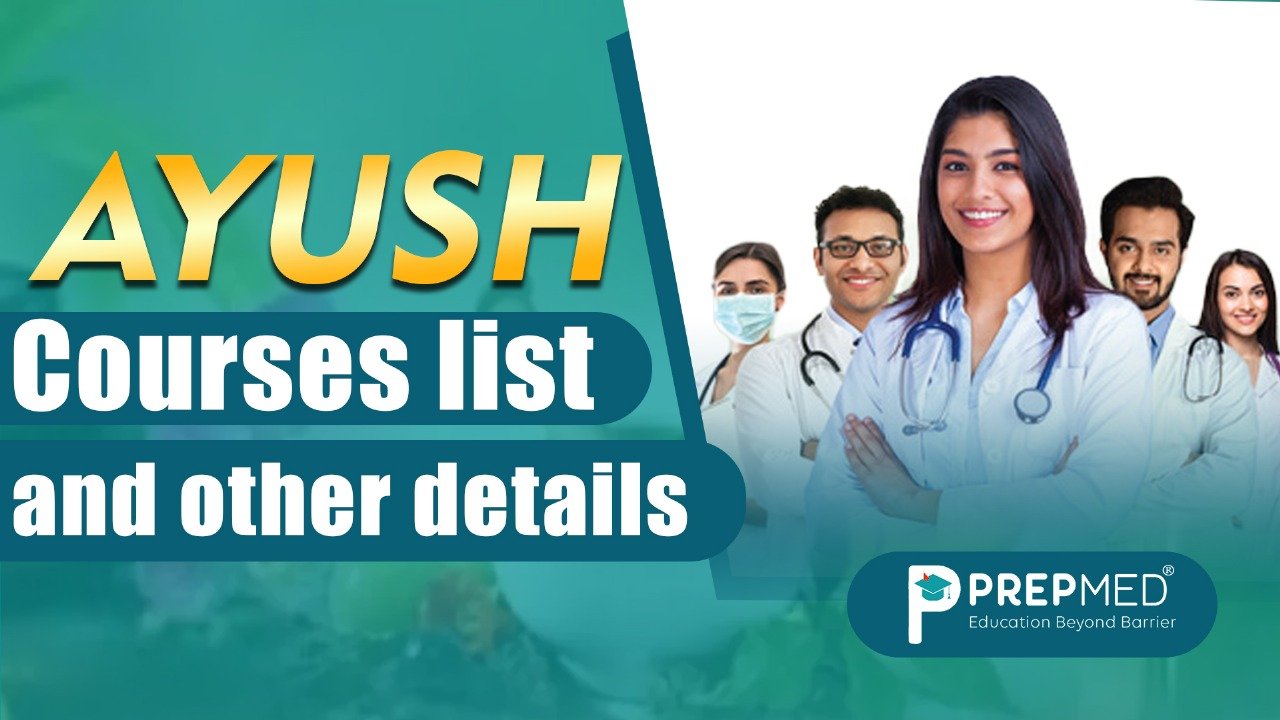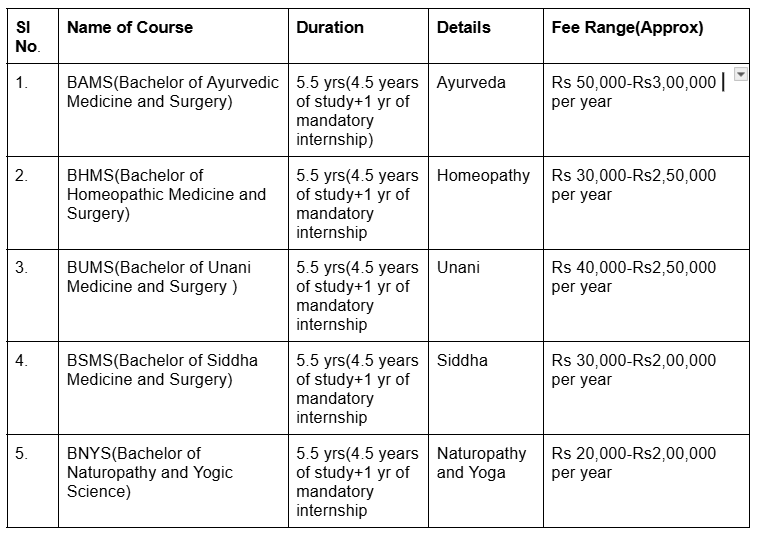October 15, 2025
AYUSH courses list and other details
India's healthcare education system offers a rich tradition in holistic medicine through the AYUSH courses. These include five large streams: Ayurveda, Yoga & Naturopathy, Unani, Siddha, and Homeopathy, all of which are based on ancient traditions and are gradually becoming more and more integrated into modern healthcare systems. In case you are planning to join any of the AYUSH courses, it is vital to know what they are, what careers they can provide after completion, their eligibility criteria, and the results you can expect.
What is AYUSH course?
Here, in this section we will discuss what is AYUSH course, the meaning and purpose. AYUSH is a combination of Ayurveda, Yoga and Naturopathy, Unani, Siddha and Homeopathy. These are traditional systems of medicine recognized by the Indian government. An AYUSH course is designed to teach ancient medical philosophies, herbal therapies, physical wellness (like Yoga), and alternative treatments that complement modern medical science. Thus when you want to know what AYUSH course is, you are asking about training that combines theory (texts, principles of health, diagnosis) and practice (practical treatment, therapies, patient interaction).
AYUSH course details
The curriculum, the duration and the specialization paths can be found under the heading AYUSH course details. A majority of the AYUSH undergraduate courses take approximately five and half years including a year of internship. Advanced degrees (master and doctoral) or specialized electives are between two to three years. It includes anatomy, physiology, diagnostic approaches specific to every tradition, herbal pharmacology, rejuvenation treatments, Yoga practices, and clinical training. The AYUSH course details also outline how students are taught using hands-on training centers, herbal gardens, and wellness clinics in addition to the conventional classroom lectures.
AYUSH course eligibility
Before you apply, it is important to know about the AYUSH course eligibility.
- Candidates usually require 10+2 (or equivalent) and include physics, chemistry and biology as core subjects, which are common to undergraduate AYUSH courses.
- Minimum aggregate marks are typically around 50-60%, but again, it might vary according to the college type and quota. There are those that require prior knowledge of Ayurveda or herbal sciences, and others only need a biology background.
- Age restrictions usually follow general education board norms.
- In postgraduate AYUSH courses, a relevant bachelor-degree qualification in AYUSH course, or occasionally, biomedical science, is required with qualifying marks as well.
List of AYUSH courses and their duration:
AYUSH course fee structure
While exploring the AYUSH course fee structure, students must remember that this varies by colleges(private vs government), location and specialization. Government colleges are rather affordable; you can expect to pay between INR 20,000-80,000/yr for undergraduate AYUSH programs in state colleges, and as much as INR 1,000,000-2,50,000/yr in private colleges. The postgraduate or super-specialty AYUSH course fees tend to be more expensive. Costs for textbooks, practical training, herbal laboratory supplies, hostel and living expenses greatly influence the total course fee structure.
Is NEET required for AYUSH?
One of the frequently asked questions: is NEET required for AYUSH? Yes, in most states and central AYUSH boards, one has to appear in NEET (National Eligibility cum Entrance Test) in order to enter AYUSH courses at the undergraduate level.
The NEET is the entrance test that is used as the standard qualifying exam to shortlist qualified candidates to grant admission in AYUSH and MBBS and BDS undergraduate programmes. A lot of AYUSH colleges will not entertain your application without a valid NEET score, unless there are special state quotas or other entrance tests.
NEET cutoff for AYUSH courses
To estimate your chances, it is important to know the NEET cutoff for AYUSH courses. Cutoffs also differ enormously by state, category (General, OBC, SC/ST), and reputation of the college. In the case of most reputable government AYUSH colleges, NEET cutoff percentile could be around 50-60% in the case of General category and far less in the case of reserved categories. Cutoffs may be lower in private colleges. To plan properly, you need to check the latest years cutoff data of the particular AYUSH course and college that you are targeting.
In this article, we look at AYUSH courses under NEET. Undergraduate AYUSH courses are included in NEET and are known as Bachelor of Ayurvedic Medicine and Surgery (BAMS), BHMS(Bachelor of Homeopathic Medicine and Surgery), Bachelor of Unani Medicine and Surgery (BUMS), Bachelor of Siddha Medicine and Surgery (BSMS), Bachelor of Naturopathy and Yogic Science(BNYS) in certain colleges. To gain admission in these AYUSH courses under NEET, a student has to attain a minimum of NEET score, register by means of counseling and meet all the reservation and eligibility criteria.
AYUSH courses scope
What is the scope of AYUSH courses once you complete them? Graduates may become registered practitioners in their respective domains, work in AYUSH hospitals and clinics, traditional wellness centers, herbal research labs, pharmaceutical firms making herbal formulations, or in academic teaching and research roles. The rising interest in holistic health globally has expanded opportunities for wellness tourism, integrative medicine, and preventive healthcare. Thus, the AYUSH courses scope is much broader now than in past decades.
Conclusion
In short, the AYUSH courses provide a combination of ancient knowledge and modern health care requirements. Besides learning what AYUSH course is and learning the AYUSH course details, eligibility standards, fee structures, and the importance of NEET, the value of being knowledgeable can hardly be overestimated. By understanding trends in NEET cutoffs and which AYUSH courses under NEET are offered, candidates will be able to make wise educational choices. Due to a wide scope of AYUSH courses, graduates will definitely have rewarding and flourishing careers.
FAQs
1.How long are the AYUSH courses?
The average time of most undergraduate AYUSH courses is 4.5 years plus one year internship. Specialised and postgraduate programs can last 3 years on top of that.
2.Are NEET mandatory for all AYUSH programs?
Undergraduate AYUSH courses in many states and colleges need NEET, though there may be different or localized entry exams or requirements in some colleges. Always verify the admission criteria of the college.
3.What are the qualifications I need to apply?
In the case of the AYUSH undergraduate courses, you have to fulfill the 10+2 with Physics, Chemistry, Biology, and in most cases, you have to score above the minimum aggregate (usually between 50- 60%). Additional eligibility requirements can involve age restrictions or domicile criteria.
Also read:
AYUSH courses list under NEET
How To Prepare For NEET - The Complete Roadmap
PrepMed NEET Scholarship for NEET Aspirants







